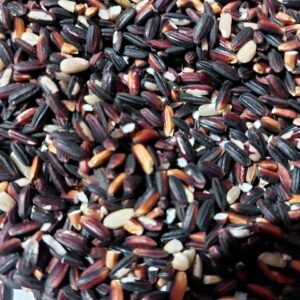Black Rice: Nutrition Facts
This unique organic forbidden rice also called “longevity rice” is grown following traditional organic methods, using cow dung, Vermicompost, and Neem Cake. Our organic forbidden rice has a roasted nutty flavor with a soft texture and turns a deep purple color once cooked. Forbidden rice is a natural source of magnesium, protein, and fiber. Rich in fiber, antioxidants, vitamins, and minerals, black rice is considered highly nutritious.
A 100g of uncooked black rice contains:
• Protein – 9g
• Carbohydrates – 75.6g
• Fat – 3.33g
• Fiber – 2.2g
• Iron – 2.4 mg
• Sugar – 0g
• Fatty acids (both saturated and trans fat) – 0g
• Cholesterol – 0g
Black rice contains no sugar. Though it is high in carbs, it gets digested slowly and does not cause an increase in your blood sugar levels. Diabetic patients must consider adding black rice to their diet.
Buy at our Nursery Location:
ARTI Nursery, Biridi Police Station Road, Hajipur, Jagatsinghpur , 754111, ODISHA.
Place your order online: www.nursery.igayan.com
11 Surprising Benefits and Uses of Black Rice
1.Good source of several nutrients: Black rice is a good source of several nutrients, particularly protein, fiber, and iron.
2.Rich in antioxidants: Research shows that black rice contains over 23 types of antioxidants and has the highest antioxidant activity of all rice varieties.
3.Contains the plant compound anthocyanin: Anthocyanin is a pigment that’s responsible for the black-purple color of forbidden rice. It’s also been found to have potent anti-inflammatory, antioxidant, and anticancer effects.
4.May boost heart health: Black rice contains antioxidants that have been shown to help protect against heart disease. However, more research is needed to understand black rice’s effects on heart disease.
5.May have anticancer properties: Early research suggests that the anthocyanins in black rice may have strong anticancer properties, but more studies are needed.
6.May support eye health: Black rice contains the antioxidants lutein and zeaxanthin, both of which have been shown to protect your retina from potentially damaging free radicals. While anthocyanins may also protect eye health, research in humans is currently lacking.
7.Naturally gluten-free: Black rice is naturally gluten-free and can be a good option for those with celiac disease or gluten sensitivity
8.May aid weight loss: Given that black rice is a good source of protein and fiber, it may aid weight loss. Also, while animal studies have suggested that anthocyanins may have benefits for weight loss, more research on humans is needed.
9.Lower blood sugar levels: While more research is needed, black rice may help lower blood sugar levels in individuals with type 2 diabetes
10.May decrease your risk of non-alcoholic fatty liver disease (NAFLD): A study in mice found that adding black rice to a high-fat diet significantly reduced fat accumulation in the liver
11.Black Rice benefits for Diabetes:
a. Black rice prevents sudden spikes of glucose in the blood.
b. It makes you feel full and reduces the urge to snack due to its rich fiber content.
c. Anthocyanins in black rice act against free radicals and help diabetics fight inflammation.
d. Its antioxidant properties reduce oxidative stress caused due to high blood sugar levels.
Other Benefits:
Black Rice Oil is known for its powerful benefits because it: Detangles the hair, Makes hair softer and smoother, Increases natural shine, Makes hair stronger, Increases elasticity, Helps hair grow longer and stronger, Reduces dandruff, and Soothes Itchy Scalp.
Ways to Consume Black Rice:
Black rice is prepared similarly to other types of rice and can be added to a variety of savory and sweet dishes. The process of cooking and consuming black rice is similar to white rice. However, black rice takes a little longer to cook.
- Replace white rice with black rice and eat it with dal and curry.
- Use it to prepare purple kheer (a popular dish in Manipur).
- Make black rice bowls with your favorite veggies.
- Make black rice Khichidi by adding a small quantity of lentil (Moong), grind coconut, vegetables, and a little bit of Deshi Cow Ghee per your test
- You can also make black rice cakes and noodles.
Best Time to Consume Black Rice
The best time to consume black rice for diabetes is in the mornings and in the afternoon. As black rice is digested slowly by the human body, eating it in the evenings may lead to indigestion and bloating.









Reviews
There are no reviews yet.